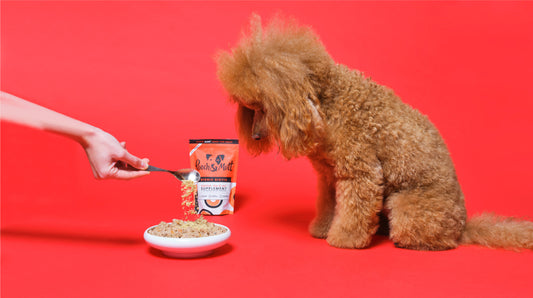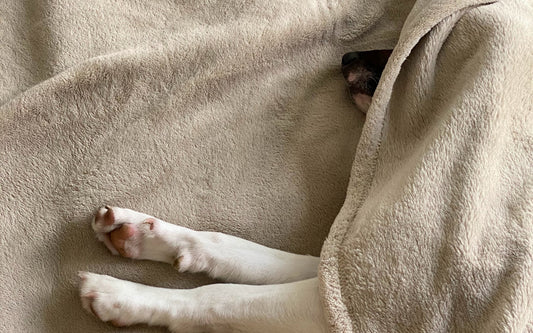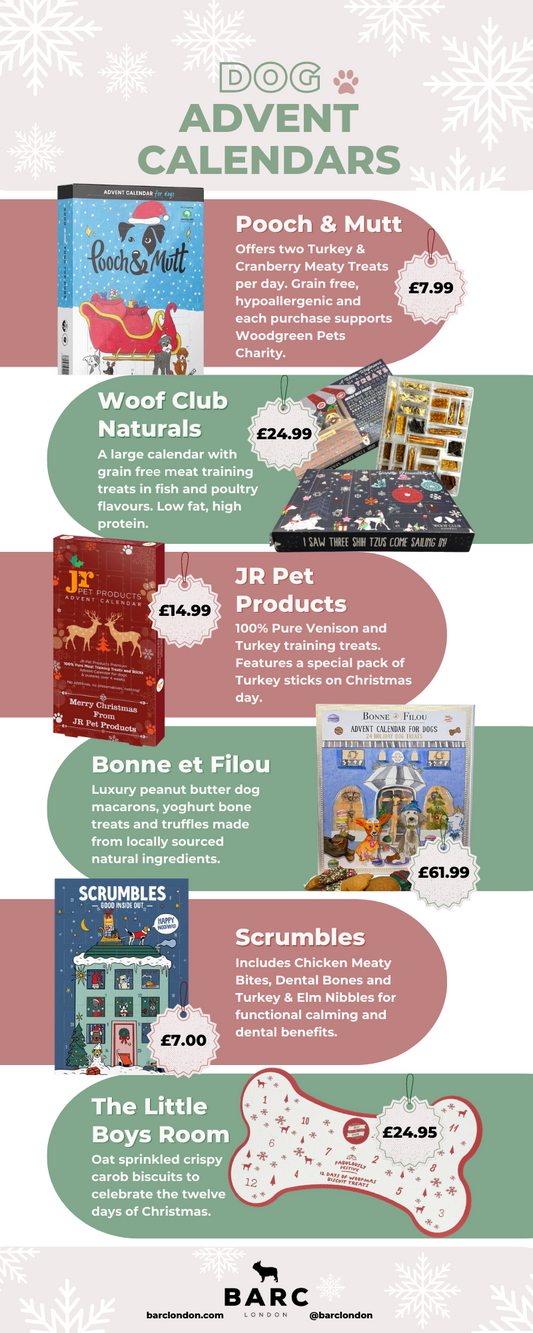If you've noticed that your dog has started honking like a goose, there’s a chance they might have caught kennel cough.
In healthy dogs, kennel cough may be nothing more than a nuisance due to the lengthy isolation period required, and you may find yourself wondering when it’s safe to walk your dog again.
Below we outline how this infection is spread, sharing tell-tail signs to look out for, and details for rest and recovery.
- What is kennel cough?
- How do dogs catch kennel cough?
- Is kennel cough dangerous?
- Common symptoms:
- How long does kennel cough last?
- Can a dog get kennel cough twice?
- Isolation period:
- Is it okay to walk a dog with kennel cough?
- Where can I get treatment for kennel cough in the UK?

What is kennel cough?
Kennel cough, also known as canine infectious tracheobronchitis, is an infection that affects a dog’s respiratory system, causing inflammation of the larynx and trachea (voice box and windpipe).
Similar to the common cold and flu virus in humans, there are lots of different strains caused by different bacteria and viruses.
Kennel cough can survive in the environment for several weeks, and is most common in areas where lots of dogs are in close proximity, i.e. kennels and doggy day care.
How does a dog catch kennel cough?
Kennel cough is a highly contagious, airborne infection that spreads easily amongst dogs. It can be caught via:
- Casual contact with an infected dog
- A sniff to say hello
- A quick play
- Sharing a water bowl with an infected dog
- At a coffee shop
- At a friend's house
- At the local park
- Walking the same route as an infected dog
- The virus can live on surfaces, so the simple act of an infected dog sneezing or coughing on a fence pole or patch of grass at the park, can spread the virus from dog to dog.
There are a few common factors that increase the chances of a dog catching the cough - including stress, cold temperatures, exposure to dust and smoke, or as the name would suggest - a stay at kennels.
This last one is due to the close, and sometimes crowded, conditions that can be common in kennels.
Is kennel cough dangerous?
Despite being highly contagious, the virus itself is rarely dangerous and will likely resolve itself in time with little or no treatment. But, much like the common cold there are various different strains and some strains can be worse than others.
If you have a puppy, an elderly dog or a dog who is already unwell, the infection can be more serious for them.
It runs the risk of developing into pneumonia, so it’s important to pay close attention to symptoms and contact your vet if you suspect they have caught the virus.
Kennel cough symptoms:
Kennel cough symptoms usually start within 3 - 10 days of exposure, but can take up to 14 days to fully present themselves.
The most common symptom to look out for is a nasty cough. Persistent and dry, it can sound like your dog is retching or trying to clear their throat.
Other symptoms can include:
- Sneezing
- A runny nose
- Discharge from their eyes
- Coughing accompanied by a white frothy phlegm
- Inflammation of the tonsils
Although it sounds terrible, the infection itself is usually mild. However, each strain is different and can increase the severity of the side affects, so always keep a close eye on your pup, and contact your vet for more advice.
If the cough persists for more than three weeks, or you notice it getting worse with signs of a reduced appetite, lower energy levels or a high temperature, then contact your vet immediately to rule out more serious diseases.
💡 Knowledge: Lung cancers, pneumonia and heart failure all cause a similar hacking cough to kennel cough.
How long does kennel cough last?
Anyone sat listening the sound of a dog’s hacking cough may be wondering how long kennel cough lasts - a very normal question to be asking yourself!
A typical case of kennel cough in dogs can last anywhere between 1 - 3 weeks and will usually resolve itself without medication. But for more extreme cases, kennel cough may persist for six weeks or even longer.
If you suspect your dog has caught the infection, or the cough isn’t getting any better after three weeks, you must speak to a vet.
Local veterinarians should know if there is a specific strain going around within your area that requires a little extra help through antibiotics, and they can also help rule out other nasty illnesses too.
Can a dog get kennel cough twice?
The short answer is yes, your dog can get kennel cough more than once.
Much like the common cold in humans, kennel cough strains are caused by different bacteria and viruses, meaning it's difficult to build lasting immunity against the infection.
Some of the confirmed viruses and bacteria known to cause the infection are parainfluenza virus and the bacterium Bordetella bronchiseptica.
Can humans catch kennel cough?
Although possible, it is very rare for humans to catch kennel cough.
There is only one strain - the strain caused by Bordetella bronchiseptica - that could potentially be contracted.
This is because humans can contract the bacterium from other sources, but there is little evidence of canine to human transmission.
How long to isolate?
As the infection is highly contagious, it’s really important to keep your dog away from other dogs and public areas where other dogs may visit.
You should isolate your dog while they are showing symptoms, and then for 2 - 3 weeks afterwards, to ensure your dog doesn’t spread the virus.
This timeframe can vary depending on the severity of the infection, so if you’re unsure speak to your vet and they will be able to best advise you.
Is it okay to walk a dog with kennel cough?
Dogs can carry the kennel cough infection for two weeks before showing symptoms, during which time it’s likely you'll be walking your dog as normal.
As soon as you notice your dog coughing, you should start your isolation period, keeping them away from other dogs, and avoiding walks altogether to help curb the spread.
Lots of rest will help with your dog get better quickly. Walking during this time can actually prolong their recovery, so keeping them settled at home is best.
If you have a garden, it’s fine to let them potter around outside, but only if there are no other dogs using the space.
Use your time at home to prioritise a little emotional or spiritual wellbeing - whether that’s through lots of cuddles, a doggy massage, or spending some time bathing in the sunniest spot of the house, it’s sure to make them (and you) feel more rested.
Keep in contact with your vet and follow their advice. If after an isolation period of two weeks, your dog is no longer coughing or sneezing, they may give you the go ahead for short dog lead walks in areas where you’re less likely to come into contact with other dogs.
Where can I get treatment for kennel cough in the UK?
The best place to get or discuss treatment for any canine condition will always be with your vet. They will be able to best assess your dog's condition to see what is required to get them back on their feet with their tails wagging!
In most cases, dogs recover from kennel cough without needing any treatment. If you suspect your dog has caught the infection:
- Keep them away from other dogs until their cough has gone
- Encourage plenty of rest - this will help with their recovery
- Remove their dog collar to avoid any extra strain on their respiratory system
For persistent cases or those that are more severe, vets may prescribe anti-inflammatories or an antibiotic kennel cough treatment to help reduce inflammation of the airways and re-set the dogs temperature.
💡 Top Tip: You can get a yearly vaccination against kennel cough, which can be done alongside your pups annual booster.
The kennel cough vaccine itself is recommended if your dog will be spending time in kennels or around lots of other dogs, at a doggy day care centre or with a dog walker.


